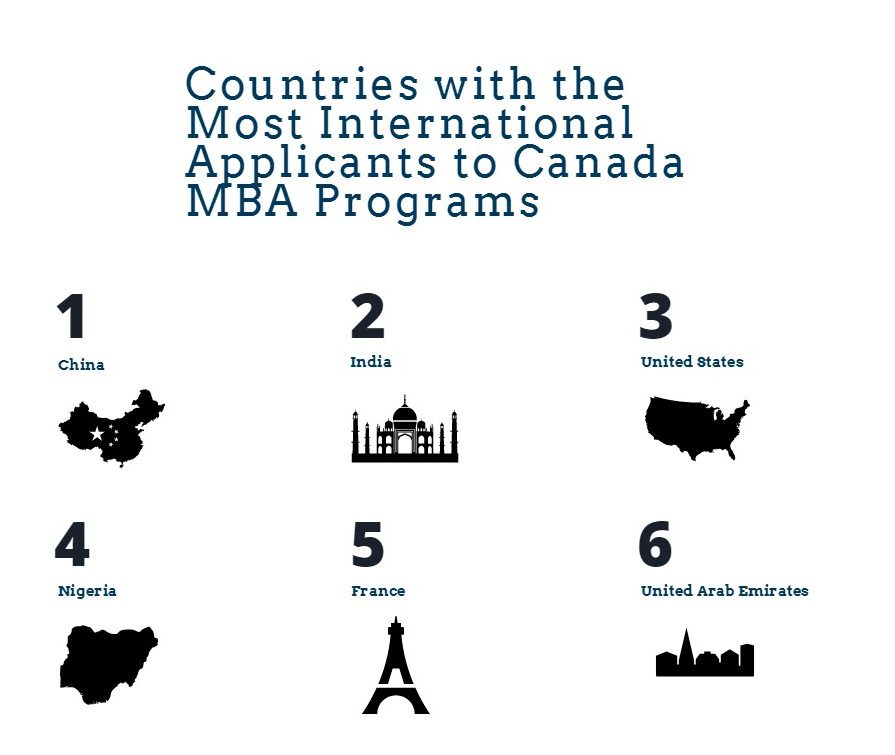The Differences Between a Full-Time MBA in New York City and Toronto

New York and Toronto are the largest cities in the United States and Canada, respectively. Both are major financial and cultural centers, and home to millions of hard-working students, employees, and businesses.
Both metros are also home to a number of quality business schools, each with their own prestigious full-time MBA programs. How do New York and Toronto compare as cities and as destinations for your full-time MBA studies? Let’s take a deeper dive and see.
Location
The most bustling and populous metro in the United States, New York City is is the capital of the business world. More Fortune 500 companies are headquartered here than in any other city. The Big Apple is not only home to Wall Street and the world’s largest financial institutions, but also media, marketing and advertising companies. New York is an enormous city and, unfortunately, expensive to live in, so it may not be for everyone.
When looking at metros with bustling financial sectors and companies, New York is often is the first to come to mind. But how about it neighbor to the north? Toronto is also considered one of the world’s fast-growing financial hubs. An article on the Huffington Post explains how Toronto has risen into the top 10 of the world’s most important financial centers. According to the Global Financial Centres Index from Z/Yen Group and Qatar Financial Centre, Toronto has surpassed Chicago and Boston to become the second-most important financial center in North America, and eighth in the world.
According to one unidentified New York banker quoted in the Global Financial Centres Index survey, “Toronto seems to get stronger and stronger. A number of our rivals have opened up subsidiaries there.”
New York City Full-Time MBA Programs
- Columbia Business School
- Stern School of Business – New York University
- Gabelli School of Business – Fordham University
- Zicklin School of Business – Baruch College
What stands out about these programs?
A Columbia MBA opens up countless career options and is sure to pay off in the long run. The median starting salaries for Columbia MBAs is $125,000, with 34 percent of full-time MBA of graduates being employed in the financial services industry. Students may assemble their own elective tracks, but the school also provides recommend course tracks for students interested in careers in entrepreneurship, healthcare, marketing, media, real estate, value investing, and social enterprise.
Meanwhile, Stern’s MBA curriculum gives students tons of flexibility, and allows degree seekers to choose one or two MBA specializations, NYU allows up to three specializations from 20 plus options. Stern makes sure that all students enrolled in the full-time program are ready for business school: Stern hosts a mandatory two-week orientation program in August called “Launch” as well as a special “Summer Start” program that allows students the school believes may need additional preparation to earn up to six credits before starting courses with their classmates in September.
Both Gabelli and Zicklin’s full-time programs feature cohort-based structures. Gabelli’s program features a New York immersion experience where, over the course of five days, students are exposed to a number of company visits with corporations like Deutsche Bank, Money.net, and Hewlett Packard. As an alternative to completing a major, Zicklin students may pursue a joint JD/MBA in conjunction with Brooklyn Law School or New York Law School.
Toronto’s Full-Time MBA Programs
- DeGroote School of Business – McMaster University
- Ivey Business School – Western University Canada
- Schulich School of Business – York University
- Ted Rogers School of Management – Ryerson University
What stands out about these programs?
DeGroote’s full-time MBA is a 16-month program ideal for candidates who are early in their career and want to gain advanced business knowledge in order to have more job opportunities. McMaster is one of only four Canadian universities ranked among the top 100 in the world, including by premiere publications like The Financial Times.
Ivey’s full-time program stands out because it can be completed in one year. During the year, students will learn business essentials from Canada’s only case-based MBA program. Students are able to experience real-world business scenarios through more than 300 cases a year, providing them of hands-on experience for how to best handle a variety of business scenarios.
The Sculich School of Business full-time MBA program is non-traditional due to its amorphous teaching format: The organization, pedagogy, and style of classes is determined solely by the most effective way to teach a particular course. This means that while some course instructors make extensive use of case studies, others do not. Other approaches to delivering courses include in-class presentations, role-playing exercises and visiting speakers and business leaders.
Schulich’s program, however, is on the more expensive side when it comes to Toronto metro business schools. The current full cost of the program in 2018-19 is $77,900 CAD for Canada residents, and $99,400 for international residents. While the tuition costs are actually higher than the likes of NYU Stern or the Columbia Business School full-time programs, because of the cost of living in New York City, the price is actually negligible—especially for Canadian residents.
Schulich/NYU/Columbia Full-Time MBA Costs
| York/Schulich | NYU/Stern | Columbia Business School |
|---|---|---|
| $57,000 (Canada Residents) | $69,086 USD | $71,544 USD |
| $77,900 (Full Cost, Canada Resident) | $110,562 (Full Cost, U.S. Resident) | $107,749 (Full Cost, U.S. Resident) |
Ryerson’s full-time MBA stands out thanks to its Management of Technology and Innovation (MBA-MTI) program, which provides graduates with skills in problem-solving, critical thinking, communication and collaboration. Despite it’s technical sounding name, the MBA-MTO is not a technical program. Instead students enrolled in this track graduate with the skills needed to manage within companies that are focused on tech and innovation.
Breaking Down the Numbers
Even for those who do not pay extra for room and board, expenses for U.S. residents studying at many NYC business schools will be higher than their neighbors to the north. According to Numbeo, the cost of living in Toronto is 24 percent less than the cost of living in New York City, and rent is nearly 40 percent less.
However, the value of the individual school tends to favor New York City programs over its Toronto counterparts. NYU Stern is currently the 12th overall on the U.S. News & World Report 2018 ranking, with CBS coming even higher at 9th overall. The ranking comparison remains consistent with The Economist as well, with CBS coming in 9th (again), Stern coming in 14th. The highest ranked Canadian program in The Economist ranking—Ivey Business School—came in 59th.
NYC/Toronto MBA Rankings
| School | Financial Times Ranking (2018) | The Economist Ranking (2017) |
|---|---|---|
| NYU Stern | 23 | 14 |
| Columbia Business School | 7 | 9 |
| Ivey | 90 | 59 |
| Schulich | NR | 69 |
The higher rankings and costs tend to, unsurprisingly, have a high correlation with financial output. MBA graduates from higher-ranked NYC metro schools tend to do better in terms of salary and bonuses. As previously mentioned, CBS Class of 2017 MBA grads pulled in a median annually salary of $125,000. Class of 2017 Schulich grads, in comparison, made an average median salary of around $90,000 USD.
For more information on the best full-time programs, check out our New York City and Toronto metro pages.
What Are The Most Valuable Toronto MBA Programs?

For prospective MBAs, looking at the price tag of earning a degree can be startling- and may even deter talented business leaders from pursuing an advanced education. The fear is certainly justified: an MBA from some of North America’s top business school can reach upwards of $100,000.
Yet, when considering the well-recorded increase that most professionals witness in their salary after earning an MBA, along with a greater likelihood of finding employment, the seemingly impossible cost of an MBA can seem more within reach.
Factors like the cost of a degree, salary increase after graduation and employment rate of graduates are all key numbers that must be considered together before one can determine the true cost of a degree. Below, we take a glance at these different numbers and round up the Toronto MBA programs that provide the best return on investment.
Ivey Business School – Western University Canada
The Ivey Business School at Western University Canada MBA program began in 1950, and has since established itself as one of the best offerings in the world. The business school’s rich legacy has been recognized again and again by the likes of Bloomberg, which touted its MBA as the 11th best international MBA program in 2017. Ivey, with its main teaching center on Western University’s campus in London, Ontario, offers a variety of MBA experiences, such as an full-time, Accelerated, and Executive MBA. The Tangerine Leadership Centre in Toronto’s downtown business district also offers EMBA courses through the Ivey Business School.
The full-time MBA at Ivey is a 12-month program that costs $88,250 to attend for domestic students and $101,500 USD for international applicants. According to the most recent Ivey employment report, about 91 percent of the 169 students in the Class of 2017 earned a job opportunity shortly after graduation, reporting an average salary of $103,560. More than one-third of the Class of 2017 also earned a singing bonus upon employment with a median value of $15,000. Signing bonuses for Ivey MBA grads ranged as high as $45,000 alone, proving that even with high price tag, the degree can immediately pay off.
Ivey Return on Investment (In USD)
| Ivey MBA Tuition | Median Signing Bonus | Median Annual Salary |
|---|---|---|
| $88,250 | $15,000 | $103,560 |
Schulich School of Business – York University
The Schulich School of Business at York University offers students a number of ways to pursue an advanced business education, from full-time, Executive, and International MBA programs as well as offering Master’s degrees in accounting, finance, business analytics, and more. The Schulich International MBA is the first of its kind in Canada, and the Kellogg-Schulich Executive MBA is North America’s first ever cross-border executive MBA degree. However, length of programs should be taken into consideration, since it will determine the time without a full-time income; an important distinction for students that are looking to enter the workforce as soon as possible. At 16-20 months, an MBA at Schulich will take slightly longer to earn than year-long programs like at Ivey.
Roughly 89 percent of graduates from Schulich’s MBA programs find a job within three months, earning an average base salary of $91,860 USD and an average singing bonus of $12,050. Full-time MBA students at Schulich will pay a tuition of $77,900 during the life of the degree, while part-time students pay $81,000. Meaning, grads typically earn about $10,000 more in their first year of employment than the entire cost of the program.
Schulich Return on Investment (In USD)
| Schulich MBA Tuition | Median Signing Bonus | Median Annual Salary |
|---|---|---|
| $77,900 | $12,050 | $91,860 |
Rotman School of Management – University of Toronto
The Rotman School of Management at the University of Toronto can boast of origins dating all the way back to 1901, when the university first established a diploma program in commerce. By 1972, the School of Business was an official part of the university, and hasn’t stopped growing since. Today, the Rotman School of Management has become universally recognized by the likes of Financial Times the and Bloomberg as one of the best business schools in the country. Located in downtown Toronto, Rotman offers a two-year, full-time MBA degree, but also more flexible options such as part-time morning and evening MBA programs, executive MBA, and an 18-month Global Executive MBA.
The two-year, full-time MBA tuition at Rotman comes with a price tag of $101,350 CAD ($74,999 USD). However, graduates—80 percent of whom typically find employment within three months after earning their degree—saw a median base salary of $85,000 and median signing bonus of $13,500. This salary increase seems to be typical of MBA graduates in Canada, so considerations of employment rate and program duration may be most important when evaluating Return on Investment for top programs in Canada.
Rotman Return on Investment (In USD)
| Rotman MBA Tuition | Median Signing Bonus | Median Annual Salary |
|---|---|---|
| $74,999 | $13,500 | $85,000 |
Kings of the North: Should You Get a Part-Time MBA in Chicago or Toronto?

In many ways, Chicago and Toronto are very similar world class cities: Both are situated on a Great Lake, host an “Original Six” hockey team, and both metros suffer from “second city” inferiority complexes. Both metros also have plenty of competitive business school options for professionals who want to earn an MBA. Continue reading…
Finding The Best Toronto Accelerated MBA Programs

One-Year or Accelerated MBA programs give students the opportunity to gain the strong business foundation of an MBA education in half the time as a traditional MBA. Students in accelerated MBA programs can also reduce the overall cost of their degree while also minimizing the amount of time spent without earning a full-time income.
Last summer, we took a look at some of the city’s best accelerated program offerings. However, we have updated our overview, including more of our favorite Toronto school’s with uniquely exciting accelerated programs.
The Toronto Accelerated MBA Programs You Need To Know
Schulich School of Business – York University
The Accelerated MBA at York University’s Schulich School of Business gives students the chance to dive straight into the second year of their degree program. With the option to pursue the degree either full or part-time, students can complete the Schulich MBA in as little as eight months. The program is reserved for students who have completed either a BBA or BCom degree in Canada within the past ten years that is similar in structure to the BBA at Schulich, but students without this requirement may still be eligible for some form of accelerated degree.
DeGroote School of Business – McMaster University
The Accelerated MBA at the McMaster University DeGroote School of Business can be completed in as little as eight months if pursued on a full-time basis. Students in the accelerated program are exempt from first year MBA courses and will only pay half the tuition of the two-year program. The accelerated program is designed for students who earned an undergraduate business degree in the last ten years, maintained at least a B average in the final two years of their undergraduate degree, and have at least one year of professional work experience.
YOU MIGHT ALSO LIKE: Canada’s MBA Programs are Rising
Ivey Business School – Western University Canada
The One-Year accelerated MBA program at the Ivey Business School at Western University Canada is designed for ambitious students who want to further develop their leadership ability and accelerate their career. The Ivey MBA gives students real-world experiences through global learning opportunities and projects that provide hands-on business practice. The Ivey curriculum is centered around a unique case study method, which uses over 300 cases each year to allow students to practice real business challenges.
Rotman School of Management – University of Toronto
For advanced business school students with more professional experience, the Rotman School of Management at the University of Toronto offers a uniquely inviting One-Year Executive MBA; perfect for upper level managers looking to further develop their skills in management, decision-making and leadership. Within 13 months, the EMBA will provide students with hands-on leadership experience designed to change the way MBAs approach business and make decisions. The degree is also designed work around a student’s career, providing the opportunity for students to constantly be applying their education outside of the classroom.
Ted Rogers School of Management – Ryerson University
At Ryerson University’s Ted Rogers School of Management, students can select from a number of different formats in which to pursue their MBA. Students with a BBA, BCom or equivalent degree and at least two years of North American work experience have the option to earn their MBA in just 12 months. The Ted Rogers MBA program is centered around experiential learning, with events like Integrative Week/Weekend, allowing student work to be critiqued by industry professionals. Students will also be required to complete their final semester centered around real-world application of theory and analysis learned in the classroom through a capstone project and internship.
Schulich Tops Forbes’ Canada Rankings

Canada: birthplace of poutine and your potential business school destination. If you’re looking at the latter, the Schulich School of Business at York University should be at the top of your list. It’s at the top of Forbes’.
The publication has ranked the business school as the best in Canada among two-year MBA programs. For all non-U.S. schools, Schulich came in fourth overall when looking at how long graduates take to make up the cost of their MBA.
Forbes‘ annual ranking analyzes what business schools are the best—and which ones are worth attending. They base their lists on a school’s return on investment, or, ROI. With this qualifier in mind, Schulich won among one-year and two-year MBA programs in Canada.
“Forbes has once again rated the Return on Investment provided by a Schulich MBA degree as one of the best in the world,” said Schulich Dean Dezsö J. Horváth, in a press release. “For MBA students, the Return on Investment they receive after graduating is a significant factor when determining the value of their degree. The latest Forbes survey captures an important statistical measure of the return on investment our MBA students can expect once they graduate.”
The school is not far from the bustle of downtown Toronto, providing an international appeal to its students, most of whom come from beyond Canada. In 2016, half of the MBA students came from Asian countries. Schulich offers a number of MBA programs, which a person can take full-time or part-time. But there’s an executive MBA and accelerated MBA too (it takes just eight months!).
Around 26 percent of applicants are accepted, so if Schulich is top of your list, you better be ready. It probably won’t be easy.
Canada’s MBA Programs are Rising

The recent release of the GMAC 2017 Prospective Students Survey Report revealed some mixed revelations. While the status of smaller U.S. school MBA programs may be up in the air, international programs, particularly in Canada, are looking rosier than ever.
Overall, schools in Canada and Europe saw a 50 percent-plus increase in application volume from international candidates, of which GMAC speculates may be a result of political turmoil, particularly in the United States. This is a direct contrast from four years prior, in which less-than half of the Canada, UK, and other European business schools were seeing international applicant growth.
In the GMAC survey, an anonymous Canadian full-time MBA also noted, “The US presidential election has had a impact on our application numbers. Many international students choose Canada as their first choice.”
Niki da Silva, the Managing Director of the full-time MBA program at the Rotman School of Management at the University of Toronto, recently spoke with the Globe & Mail after the release of the report, saying, “This is our opportunity. We have to be anti-Canadian in this moment and really talk about what we are doing. We don’t tend to do that but we need to.”
By The Numbers
Results from the survey found subtle yet distinct differences between the international applicant pools in the major MBA location destinations.

In the United States, Europe, and Canada, according to GMAC, the two most prolific countries with international applicants were unilaterally India and China, which came in either first or second place for each region. However, for Canada, the remaining top 10 international countries with high applicant pools differed slightly from the U.S. and Europe, especially regarding Middle Eastern and North African countries. The United Arab Emirates (6th most), Tunisia (9th), and Iran (10th) were no where to be found in either the U.S. or European top ten.
Breaking the applicant pools down further, GMAC found an unsurprising correlation between the distribution of citizenship by application for Canada and the U.S. and the new data trends. After Europe, which had the most diverse applicant pool (a tricky stat since Europe is qualifying every country on the continent, while the U.S. and Canada are counted as singular entities), Canada had the world’s second biggest international pool of applicants, with less than 50 percent of Canadian business school students having official Canadian citizenship.
Domestic applications, in contrast, are actually down. But the international pool in Canada is swelling, creating substantial overall growth.
“International applicants comprised the vast majority of applications to business programs in Canada—64 percent of MBA applications and 88 percent of business master’s applications.” – GMAC
Gregg Schoenfeld, GMAC’s Director of Research, also noted upward trend for Canadian schools, saying, “This is the first time in the past five years that the majority, in fact three-quarters [of Canadian schools in the survey], are saying they are growing international volumes.”
“From a speculative point of view, it seems that the U.S. political climate has essentially driven candidates to Canada,” he continued.
YOU MIGHT ALSO LIKE: The Highest Starting Salaries for Toronto MBA Grads
The move to enroll more international applicants in Canadian schools started to emerge several years ago. Following lower periods of domestic enrollment, Canada’s MBA programs made a concerted effort to bring in more talent from abroad, creating a multi-year spring in growth that has not only benefited school enrollment, but fostered a positive international environment.
According to Global Affairs Canada, the result has been a positive economic boon as well. Upwards of 90,000 new jobs were created for Canadians just two years prior, while adding $10 billion to the country’s economy.
Tim Daus, Executive Director of the Canadian Federation of Business School Deans, previously noted that the trend was partly made possible because of the country’s flexible immigration policies, saying, “Canada’s visa requirements are much more flexible than other countries’, which gives us an edge. That makes a big difference for students who want to stay and work afterwards.”
Canadian Accolades
The substantial growth Canadian business schools have seen may not solely be the result of political overtones, rather, that many of the country’s best institutions only continue to improve.
The Schulich School of Business at York University in Toronto earned some hefty recognition from Forbes‘ recently released “Best Business Schools” global rankings, earning the 8th spot among the best international two-year program in the world. Schulich grads, Forbes claims, can expect a five-year net gain of over $48,000.
Last year’s Bloomberg BusinessWeek ranking of the best non-U.S. business schools also recognized both the Ivey Business School at Western Canada University and the Rotman School of Management among the top 25 programs in the world. Both the aforementioned Ivey and Rotman programs were recognized among the world’s 100 best by the Financial Times this year as well.
